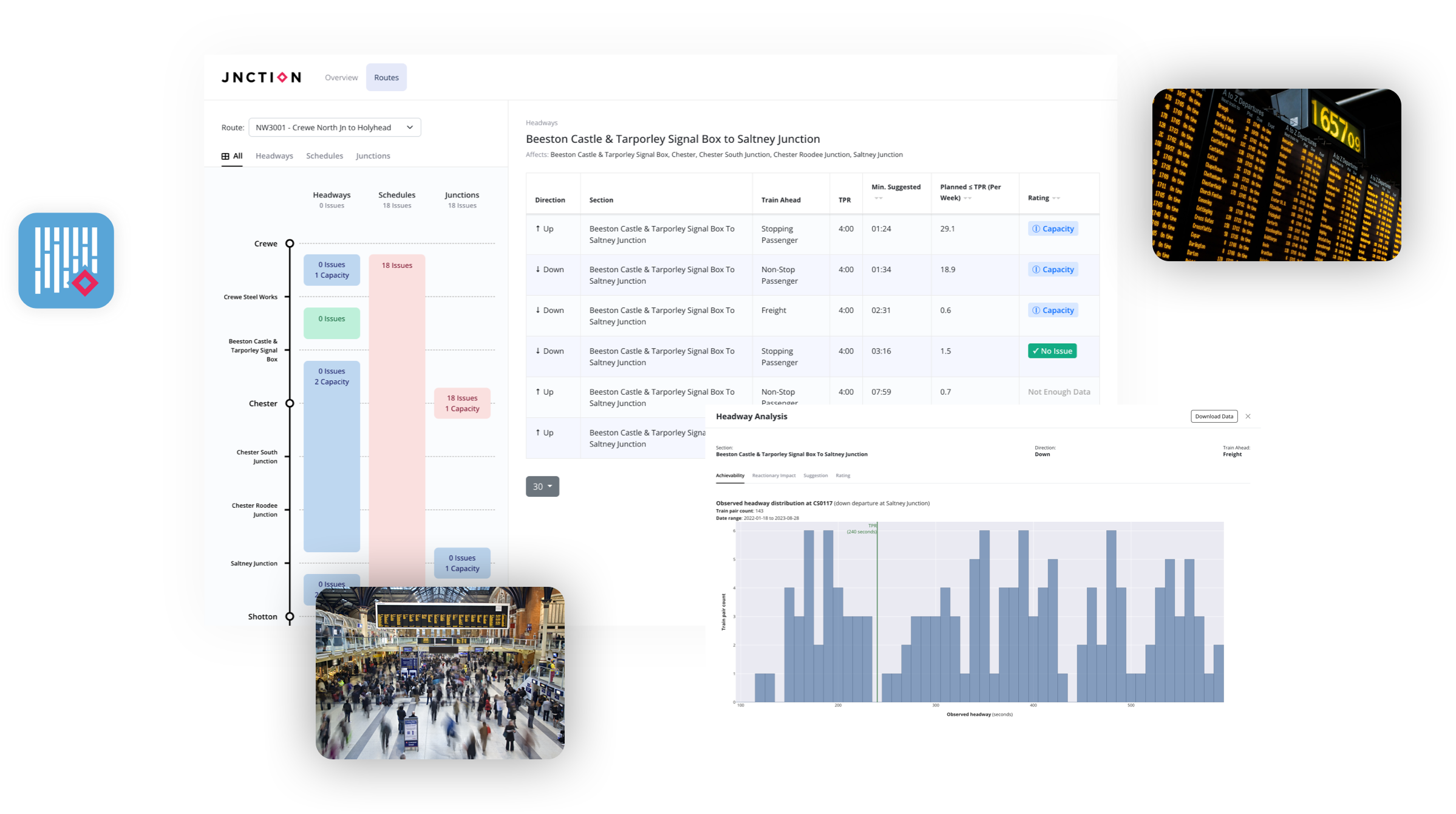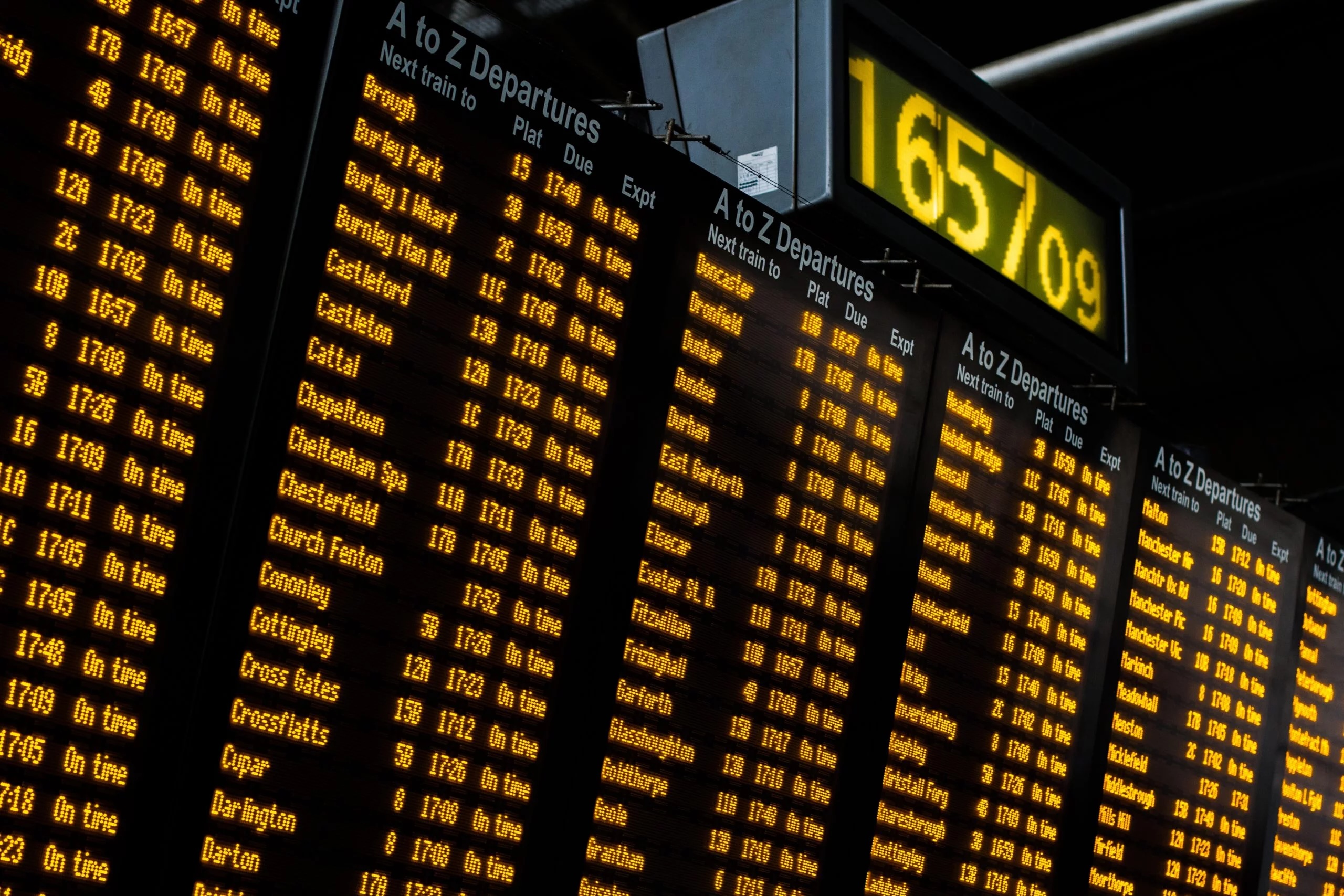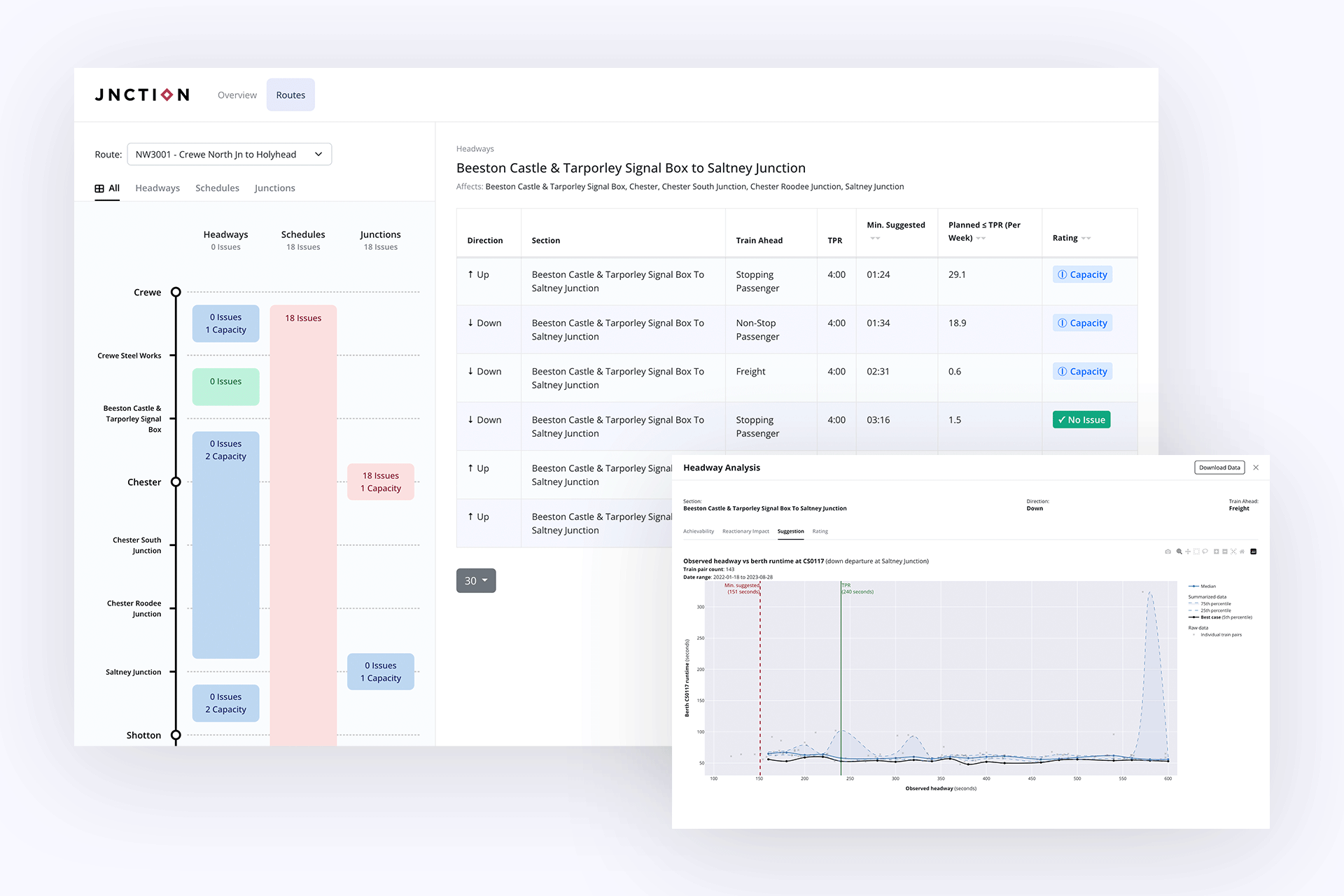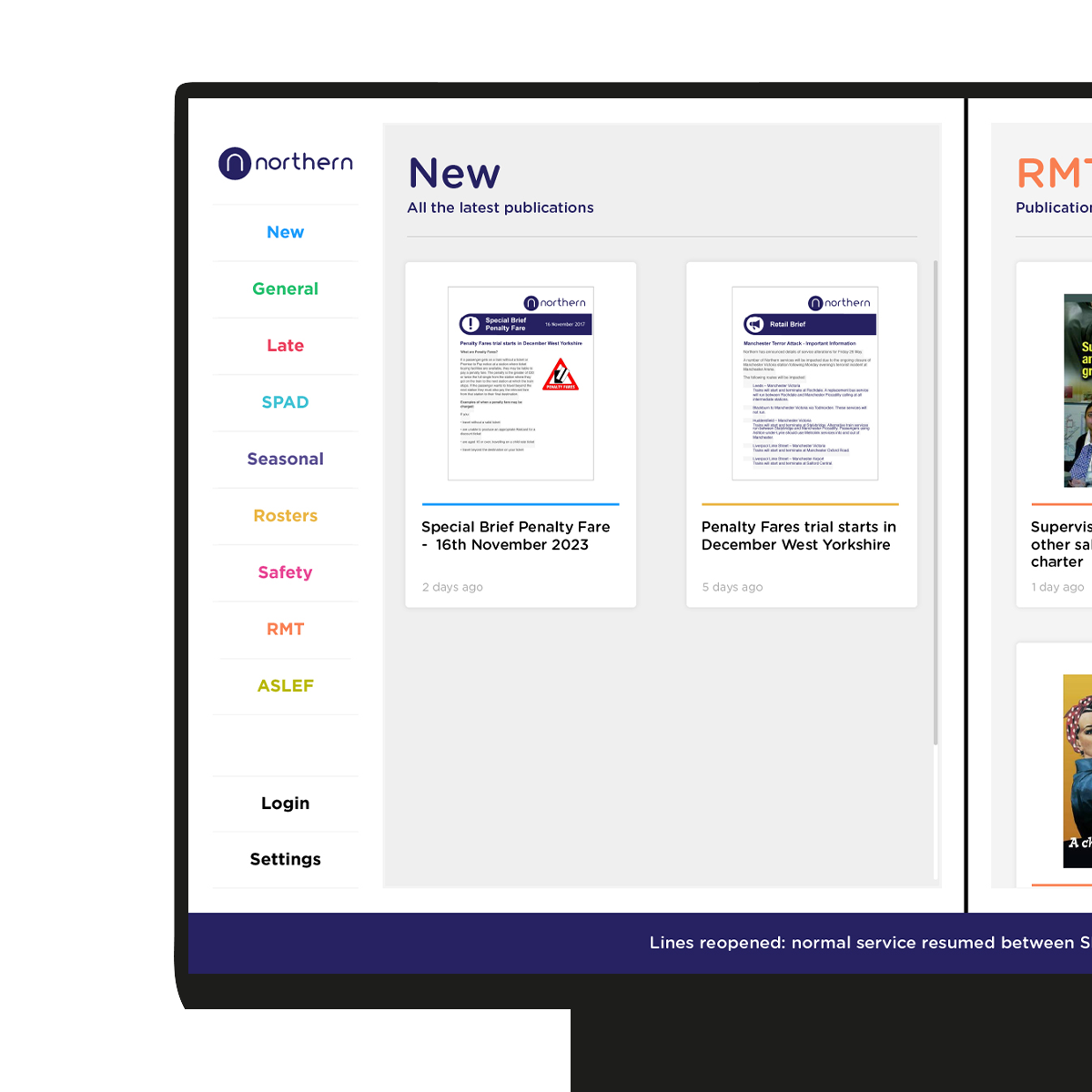- Products
- JNCTION Control
Reduce delays and improve network performance
- JNCTION Frontline
Deliver real-time station information to passengers
- JNCTION Notice Board
Streamlining communication and enhancing efficiency
- JNCTION Analyse
Analyse train movements and timetable planning rules
- JNCTION LiveData
Real-time train movement data engine
- JNCTION Archive
Download historic train movements data for use in software or analysis
- Services
- Products
- JNCTION Analyse
Reduce delays and increase capacity
Analyse train movements and timetable planning rules

Timetable planning challenges
Adding more trains to the UK railway schedule faces numerous challenges, including capacity constraints due to track and station limitations, conflicts in train paths at junctions and crossings, maintenance and engineering work reducing available track time, and the need for sufficient rolling stock that complies with safety standards and is compatible with existing fleets.
Regulatory requirements, such as minimum headways and safety standards, further restrict the number of trains that can operate on a given section of track. Balancing passenger and freight demand, optimizing peak and off-peak services, considering economic and environmental impacts, and overcoming technological limitations in signaling and communication systems are additional hurdles that must be addressed through coordinated planning and investment.


How these challenges are addressed:
The TPR tool will validate if a Timetable Planning Rule, such as a junction margin, headway, sectional run-time (SRT) or dwell is fit for purpose
The tool compares the planned SRT or dwell times to “technical values” which are calculated based on historical train movement data and are representative of how an “average” train behaves.
Potential pressure points and capacity opportunities can be exposed/highlighted within a timetable, where either too little or too much time has been allocated to a particular SRT or dwell time.

Benefits
Increased Capacity and Efficiency
By predicting and mitigating potential scheduling conflicts, the system can ensure smoother operations, reducing delays and improving overall efficiency.
Sustainability
By optimising operations, the system can reduce unnecessary fuel consumption and emissions, contributing to environmental sustainability and reducing the railway’s carbon footprint.
Cost Efficiency
The system can help minimise operational costs by optimising train schedules, maintenance, and rolling stock utilisation, leading to better resource allocation and financial savings.
Data-Driven Insights
Railway planners and operators can leverage comprehensive data analysis to make informed decisions, improve strategic planning, and identify long-term infrastructure investment needs.
Bespoke Rail Solutions
We understand that one size doesn’t fit all when it comes to rail. That’s why we offer bespoke services and customisable modules which can be mix-and-matched to ensure that your rail solutions perfectly align with your unique requirements.
We pride ourselves on our flexibility and agility, seamlessly integrating custom solutions into your project timeline and budget.
Whether you’re looking to enhance safety, improve efficiency, or optimise performance, we ensure that your railway system is tailored to meet your exact requirements.
For a consultation or a product demo, please get in touch.
Or alternatively, call us on 0203 011 1008
 We use cookies on our website to give you the most relevant experience by remembering your preferences and repeat visits. By clicking “Accept”, you consent to the use of ALL the cookies.Manage consent
We use cookies on our website to give you the most relevant experience by remembering your preferences and repeat visits. By clicking “Accept”, you consent to the use of ALL the cookies.Manage consentPrivacy Overview
This website uses cookies to improve your experience while you navigate through the website. Out of these, the cookies that are categorized as necessary are stored on your browser as they are essential for the working of basic functionalities of the website. We also use third-party cookies that help us analyze and understand how you use this website. These cookies will be stored in your browser only with your consent. You also have the option to opt-out of these cookies. But opting out of some of these cookies may affect your browsing experience.Necessary cookies are absolutely essential for the website to function properly. These cookies ensure basic functionalities and security features of the website, anonymously.Cookie Duration Description cookielawinfo-checbox-analytics 11 months This cookie is set by GDPR Cookie Consent plugin. The cookie is used to store the user consent for the cookies in the category "Analytics". cookielawinfo-checbox-functional 11 months The cookie is set by GDPR cookie consent to record the user consent for the cookies in the category "Functional". cookielawinfo-checbox-others 11 months This cookie is set by GDPR Cookie Consent plugin. The cookie is used to store the user consent for the cookies in the category "Other. cookielawinfo-checkbox-necessary 11 months This cookie is set by GDPR Cookie Consent plugin. The cookies is used to store the user consent for the cookies in the category "Necessary". cookielawinfo-checkbox-performance 11 months This cookie is set by GDPR Cookie Consent plugin. The cookie is used to store the user consent for the cookies in the category "Performance". viewed_cookie_policy 11 months The cookie is set by the GDPR Cookie Consent plugin and is used to store whether or not user has consented to the use of cookies. It does not store any personal data. Functional cookies help to perform certain functionalities like sharing the content of the website on social media platforms, collect feedbacks, and other third-party features.Performance cookies are used to understand and analyze the key performance indexes of the website which helps in delivering a better user experience for the visitors.Analytical cookies are used to understand how visitors interact with the website. These cookies help provide information on metrics the number of visitors, bounce rate, traffic source, etc.Advertisement cookies are used to provide visitors with relevant ads and marketing campaigns. These cookies track visitors across websites and collect information to provide customized ads.Other uncategorized cookies are those that are being analyzed and have not been classified into a category as yet. - JNCTION Control

